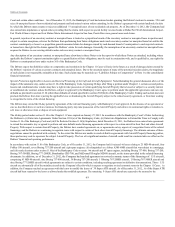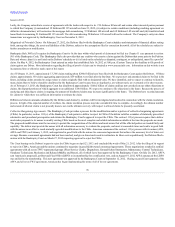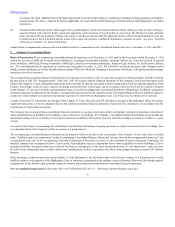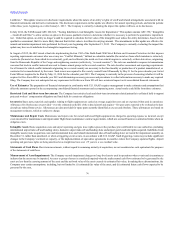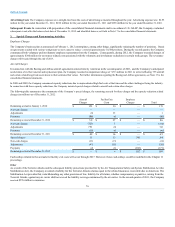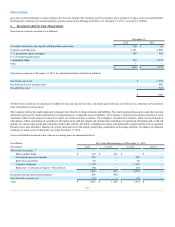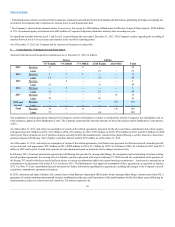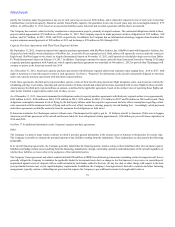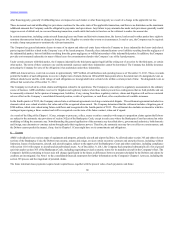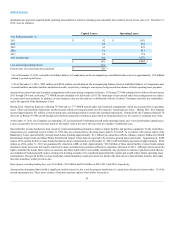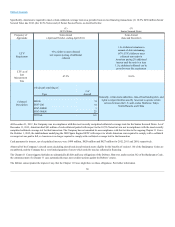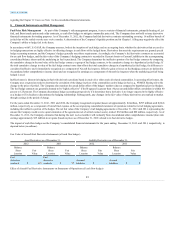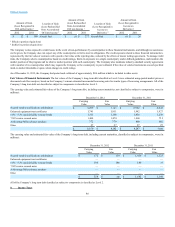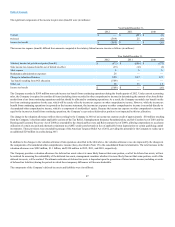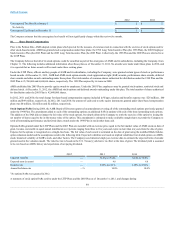American Airlines 2012 Annual Report Download - page 79
Download and view the complete annual report
Please find page 79 of the 2012 American Airlines annual report below. You can navigate through the pages in the report by either clicking on the pages listed below, or by using the keyword search tool below to find specific information within the annual report.
Table of Contents
paid by the Company under the guarantee in any one of such years may not exceed $100 million, and is reduced if capacity for one of such years is less than
a defined base year period capacity. Based on current Trans-Pacific capacity, the guarantee in any one of such years may not exceed approximately $75
million. As of December 31, 2012, based on an expected probability model, American had recorded a guarantee liability that is not material.
The Company has contracts related to facility construction or improvement projects, primarily at airport locations. The contractual obligations related to these
projects totaled approximately $79 million as of December 31, 2012. The Company expects to make payments on these obligations of $52 million, $10
million, and $17 million, in 2013, 2014, and 2015, respectively. In addition, the Company has an information technology support related contract that
requires minimum annual payments of $80 million in 2013 and declining to $70 million in 2014 through 2019.
Capacity Purchase Agreements with Third Party Regional Airlines
On September 11, 2012, American entered into capacity purchase agreements with SkyWest Airlines, Inc. (SkyWest) and with ExpressJet Airlines, Inc.
(ExpressJet), both wholly owned subsidiaries of SkyWest, Inc., to provide 50-seat regional jet feed. Both airlines will operate the services under the American
Eagle brand. SkyWest began service from Los Angeles International Airport on November 15, 2012, and ExpressJet is scheduled to begin service from Dallas-
Ft. Worth International Airport on February 14, 2013. In addition, Chautauqua continued to operate under the brand AmericanConnection ® during 2012 under
a capacity purchase agreement with American, which capacity purchase agreement was extended on November 1, 2012 to provide that Chautauqua will
continue to operate in the American network into 2014.
As of December 31, 2012, American's capacity purchase agreements with third party regional airlines had expiration dates ranging from 2014 to 2017, with
rights of American to extend the respective terms of each agreement. See Item 2, “Properties” for information on the aircraft contractually obligated to American
under such capacity purchase agreements with third party regional airlines.
Under these agreements, the third party regional airlines operate certain of their aircraft using American's flight designator codes, and American controls the
scheduling, pricing, reservations, ticketing and seat inventories of those aircraft and retains all revenues associated with revenue flights by those aircraft.
American pays the third party regional airlines an amount, as defined in the applicable agreement, based on the airlines' costs of operating those flights and
other factors intended to approximate market rates for those services.
As of December 31, 2012, American's minimum fixed obligations under its capacity purchase agreements with third party regional airlines were approximately
$249 million in 2013, $188 million in 2014, $179 million in 2015, $170 million in 2016, $11 million in 2017 and $0 million in 2018 and beyond. These
obligations contemplate minimum levels of flying by the third party airlines under the respective agreements and also reflect assumptions regarding certain
costs associated with the minimum levels of flying such as the cost of fuel, insurance, catering, property tax and landing fees. Accordingly, actual payments
under these agreements could differ materially from the minimum fixed obligations set forth above.
If American terminates the Chautauqua contract without cause, Chautauqua has the right to put its 15 Embraer aircraft to American. If this were to happen,
American would take possession of the aircraft and become liable for lease obligations totaling approximately $20 million per year with lease expirations in
2018 and 2019.
See Note 17 for additional information on the Company's capacity purchase agreements.
Other
The Company is a party to many routine contracts in which it provides general indemnities in the normal course of business to third parties for various risks.
The Company is not able to estimate the potential amount of any liability resulting from the indemnities. These indemnities are discussed in the following
paragraphs.
In its aircraft financing agreements, the Company generally indemnifies the financing parties, trustees acting on their behalf and other relevant parties against
liabilities (including certain taxes) resulting from the financing, manufacture, design, ownership, operation and maintenance of the aircraft regardless of
whether these liabilities (or taxes) relate to the negligence of the indemnified parties.
The Company’s loan agreements and other London Interbank Offered Rate (LIBOR)-based financing transactions (including certain leveraged aircraft leases)
generally obligate the Company to reimburse the applicable lender for incremental costs due to a change in law that imposes (i) any reserve or special deposit
requirement against assets of, deposits with or credit extended by such lender related to the loan, (ii) any tax, duty or other charge with respect to the loan
(except standard income tax) or (iii) capital adequacy requirements. In addition, the Company’s loan agreements, derivative contracts and other financing
arrangements typically contain a withholding tax provision that requires the Company to pay additional amounts to the applicable lender or
79


